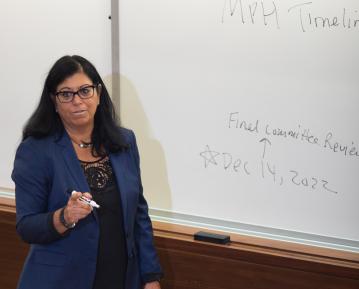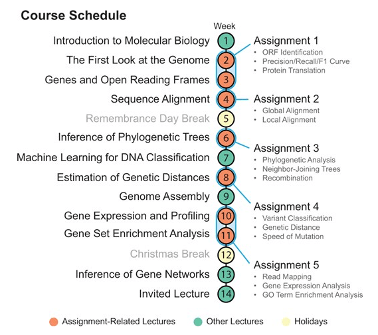The Greatest Guide To Bioinformatics Tutor
The Greatest Guide To Bioinformatics Tutor
Blog Article
Bioinformatics Tutor Things To Know Before You Get This
Table of ContentsBioinformatics Tutor Fundamentals Explained9 Simple Techniques For Bioinformatics TutorThe Bioinformatics Tutor PDFsThe Ultimate Guide To Bioinformatics TutorOur Bioinformatics Tutor PDFs
Of the total individuals associated with the training, 80% were students from public higher education organizations, while the remaining 20% came from private institutions. To certify for a certification of involvement, trainees were needed to go to at the very least 90% of the complete training hours. As an outcome of this demand, a remarkable 95% of the individuals successfully gotten their certifications, having not just satisfied the minimum attendance standards however also finished all designated activities throughout the training.
During the elevation of the COVID-19 pandemic, especially between June and August 2020, the task team was charged with organizing specialized training in bioinformatics. This training was especially focused on students from the research study team Nucleus for Research study in Applied Computer at the Federal University of Pará (UFRA) The adjustment to remote learning platforms due to the pandemic developed a chance to discover new teaching techniques and electronic devices that boosted both reach and effectiveness.
To react to the expanding need in the computer and life sciences areas, an innovative training course was presented in 2020 entitled Introduction to Artificial intelligence. This program was developed to offer an easily accessible yet detailed review of Artificial Knowledge methods, particularly as applied in bioinformatics. The program was accomplished over three months, from October to December 2020, and was supplied completely online with the Google Meet system. This digital style allowed involvement from students throughout Brazil, a lot of whom might not have had the opportunity to attend in-person sessions.
The Only Guide to Bioinformatics Tutor
Roughly 50% of the overall training hours were devoted to sensible tasks where pupils constructed smart models and applications in a variety of clinical domain names, including genetics, molecular biology, and environmental information analysis. These platforms allowed trainees to engage in real-time information control, design training, and algorithm testing.
The program attracted 80 participants in total. Sixty of them were affiliated with various greater education and learning establishments in the state of Pará, while the continuing to be twenty originated from organizations located in five various other Brazilian states. This wide geographical representation highlighted the national interest in bioinformatics and the expanding need for specialized skills in this area. By introducing Expert system in a pertinent and functional context, the effort served to link the space between theory and real-world application, supplying students with a solid structure for future research study or employment in the area.
The training initiative created component of a broader scholastic outreach effort referred to as the Bioinformatics on the Road job. This task has, throughout the years, introduced lots of pupils to the world of bioinformatics and computational biology. The occasions held under this umbrella campaign have taken area across several areas and years, as summarized in Table 1 (List of occasions, locations, years, and overall numbers of pupils and trainers)
Several of these teams, initially brought together by their involvement in training occasions, have actually because gone on to produce independent clinical research study in visit this website partnership with neighborhood academic organizations. The training not only promoted scientific thinking within the context of bioinformatics however additionally triggered joint connections that prolonged beyond the training atmosphere.
The Single Strategy To Use For Bioinformatics Tutor
The job itself was conceptualized and organized by megabytes and RR, who supervised the planning and implementation of each action. Lectures were delivered by a multidisciplinary group containing megabytes, FA, EF, KP, JS, DM, SN, LP, LG, RR, a/c, and ih. The same group, omitting IH and RR, additionally acted as tutors for the practical training components. Financing for the task was supplied with the give 88887.200562/ 2018-00 from CAPES. The authors prolong their appreciation to everyone that added to the realization of this job, whether straight or indirectly, considering that its creation.
The Federal University of Pará's Workplace of Research (PROPESP/UFPA) likewise provided monetary assistance, specifically for the production of the final manuscript. The writers proclaim no industrial or economic disputes of passion that could have affected the research. In addition, all analyses and point of views expressed in this write-up are entirely those of the writers and do not always reflect those of their respective establishments, the publisher, editors, or reviewers associated with the magazine procedure.

The Only Guide for Bioinformatics Tutor
From an instructional viewpoint, the training approach used in the training was deliberately interactive. Classes were conducted in a manner that urged student involvement and conversation, surpassing rote memorization to check out exactly how ideas are created, used in every day life, and checked in academic setups. The instructional philosophy focused on nurturing both solid and having a hard time trainees, supplying individualized support, and building confidence with sustained mentorship and patience.

Each group, including approximately 36 participants, was sustained by 3 advisors-- a lot of whom were postdoctoral scientists with specific know-how. These coaches not only aided design the group tasks however likewise facilitated their implementation, ensuring that each study concern was both properly challenging and appropriate. The goal was to offer a naturally practical context that individuals could discover with open-ended goals and accessibility to curated datasets.
For extra understandings into the methodology and end results of this project-based knowing approach, viewers are guided to S1 Text, that includes in-depth descriptions of the instructional framework, evaluation methods, and task motifs used in the training sessions.
Things about Bioinformatics Tutor
Of the total individuals involved in the training, 80% were students from public higher education you could try this out and learning establishments, her comment is here while the staying 20% came from personal establishments. To qualify for a certificate of involvement, trainees were required to go to at least 90% of the overall training hours. Especially, past the students that registered in the training sessions, seven knowledgeable teachers got involved in delivering the programs, while 3 committed research professors coordinated the overall training procedure. Approximately 50% of the complete training hours were dedicated to practical tasks where pupils built smart models and applications in a range of clinical domain names, consisting of genes, molecular biology, and ecological information analysis. The training not only fostered scientific thinking within the context of bioinformatics but additionally triggered collaborative connections that extended beyond the training environment.
Report this page